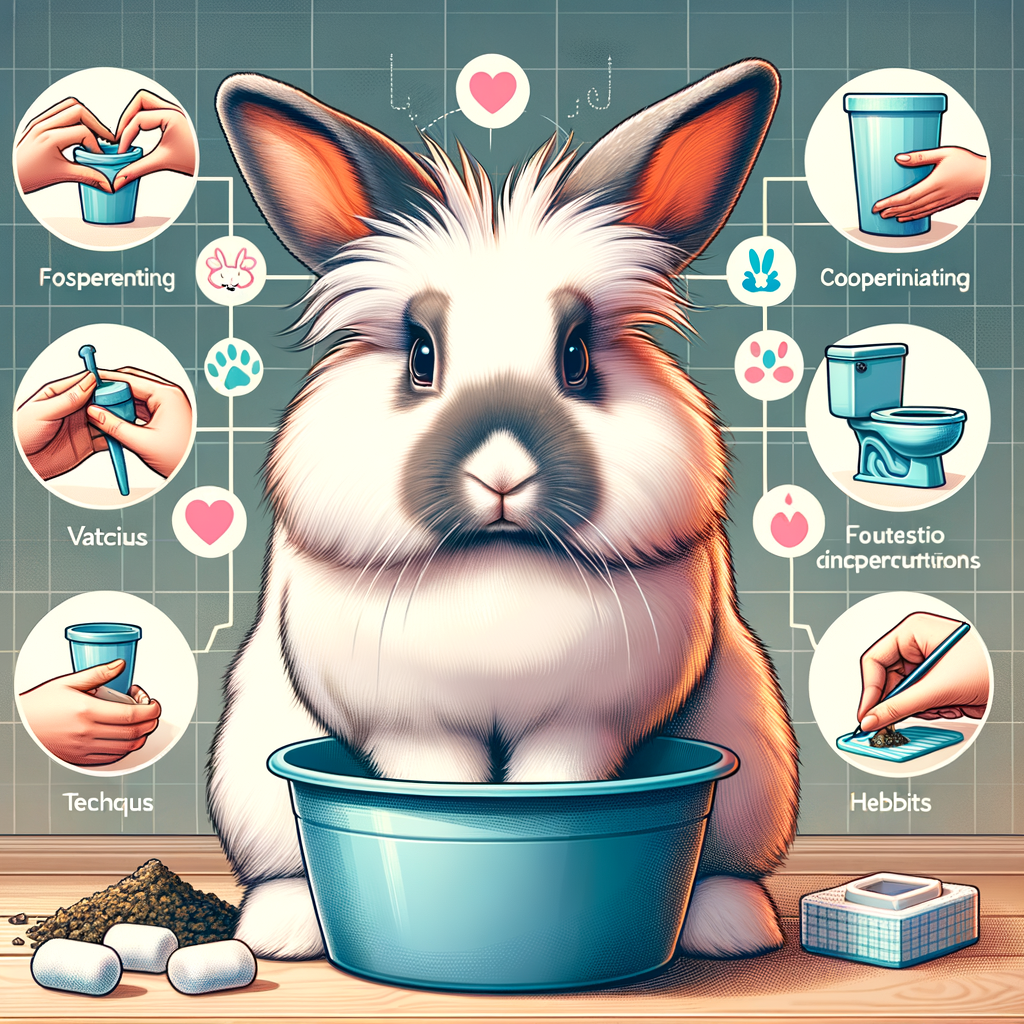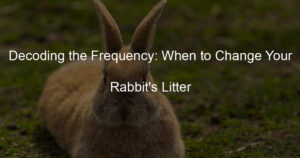
Introduction to Lionhead Rabbit Toilet Training
Training your Lionhead rabbit to use the toilet can be a rewarding experience. Not only does it make cleaning easier, but it also helps maintain a healthier environment for your pet. In this section, we will discuss the importance of rabbit bathroom habits and the challenges you might face during the training process.
- Importance of Rabbit Bathroom Habits
- Challenges in Training Lionhead Rabbit
Rabbits are naturally clean animals. They prefer to keep their living area tidy, which includes their bathroom habits. Proper toilet training can help maintain this cleanliness. It also reduces the risk of diseases caused by bacteria in their waste. Moreover, understanding your rabbit’s bathroom habits can give you insights into their health. Changes in their bathroom habits can be an early sign of health issues.
Training a Lionhead rabbit can be challenging. Unlike dogs or cats, rabbits are prey animals. This means they are naturally cautious and can be resistant to change. Patience and consistency are key in this process. Another challenge is their unique digestive system. Rabbits need to eat their droppings to get necessary nutrients. This can make toilet training tricky. However, with the right techniques and understanding of their behavior, these challenges can be overcome.
In the following sections, we will delve deeper into understanding Lionhead rabbit behavior, effective techniques for toilet training, and provide practical tips to make the process easier for you and your pet.
Understanding Lionhead Rabbit Behavior
When it comes to toilet training your Lionhead rabbit, understanding their behavior is key. Lionhead rabbits, like other breeds, have unique behavioral traits that can be leveraged during toilet training. Let’s explore two of these traits that are particularly relevant.
Behavioral Traits Relevant to Toilet Training
- Marking Territory
- Preference for Clean Spaces
Lionhead rabbits have a natural instinct to mark their territory. This is a common behavior among many animals, and rabbits are no exception. They often mark their territory by leaving droppings in specific areas. While this might seem like a challenge for toilet training, it can actually be used to your advantage. By placing the litter box in the area your rabbit has chosen as its territory, you can encourage them to use it for their bathroom needs.
Rabbits are clean animals by nature. They prefer to eat, sleep, and play in clean spaces. This is another trait that can be utilized during toilet training. By keeping their living area clean and placing the litter box in a separate area, you can encourage your rabbit to use the litter box for their bathroom needs. This is because they will naturally want to keep their living area clean.
Understanding these behavioral traits can greatly improve the success of your toilet training efforts. By working with your rabbit’s natural instincts, rather than against them, you can create a positive and stress-free toilet training experience for both you and your Lionhead rabbit.
How Behavior Affects Bathroom Habits
Understanding the behavior of your Lionhead rabbit is essential in guiding its bathroom habits. Let’s delve into the rabbit’s natural instincts and how to use these behaviors to encourage proper bathroom habits.
- Understanding Rabbit’s Natural Instincts
- How to Use these Behaviors to Encourage Rabbit Bathroom Habits
Rabbits are naturally clean animals with a strong instinct to keep their living area tidy. They will typically choose one spot in their cage or hutch to use as a bathroom, keeping the rest of their space clean. This instinct is rooted in their wild ancestors’ need to avoid attracting predators with scent.
Furthermore, rabbits are territorial animals. They use their droppings to mark their territory. This behavior can be seen in both wild and domesticated rabbits. Understanding these natural instincts can help you guide your rabbit’s bathroom habits.
By understanding your rabbit’s natural instincts, you can use them to your advantage when toilet training. For instance, you can place a litter box in the corner of the cage that your rabbit has chosen as its bathroom area. This aligns with their instinct to keep their living area clean while also allowing them to mark their territory.
It’s also important to keep the litter box clean. Rabbits are more likely to use a clean litter box, as it aligns with their natural instinct for cleanliness. Regularly cleaning the litter box can encourage your rabbit to continue using it, making toilet training easier and more successful.
In conclusion, understanding your rabbit’s natural instincts and behaviors can greatly assist in toilet training. By working with their instincts, rather than against them, you can create a comfortable and clean environment for your rabbit, while also making toilet training a more straightforward process.
Techniques for Rabbit Toilet Training
One of the most important steps in rabbit toilet training is setting up the litter box. This process involves two key steps: choosing the right litter box and determining its proper placement. Let’s delve into each of these steps in detail.
Setting Up the Litter Box
- Choosing the Right Litter Box
Choosing the right litter box for your rabbit is crucial. Rabbits prefer a spacious litter box where they can comfortably sit. A litter box with high sides is also recommended to prevent any mess from scattering outside. However, ensure that the entry point is low enough for your rabbit to easily hop in and out. You can consider a cat litter box as it usually meets these requirements. Remember, the comfort of your rabbit is paramount in this selection process.
- Proper Placement of the Litter Box
The location of the litter box plays a significant role in successful toilet training. Rabbits are creatures of habit and prefer to do their business in the same spot. Observe your rabbit’s behavior and identify their preferred corner. This is the best place to set up the litter box. Make sure the area is quiet and away from their feeding area. Rabbits do not like to eat where they eliminate. Also, avoid frequently moving the litter box as it can confuse your rabbit and disrupt their toilet training.
Setting up the litter box correctly is a vital step in rabbit toilet training. By choosing the right litter box and placing it in a suitable location, you can make the training process smoother and more effective for your furry friend.
Encouraging Use of the Litter Box
Training your Lionhead rabbit to use the litter box can be a rewarding experience. It requires patience, consistency, and a positive approach. Here are two effective techniques to encourage your rabbit to use the litter box:
- Using Treats and Rewards
Just like humans, rabbits also respond well to positive reinforcement. When your rabbit uses the litter box correctly, reward them with a small treat or a gentle pat. This will help them associate the litter box with positive experiences.
Remember, the treats should be healthy and suitable for rabbits. Too many treats can lead to obesity and other health issues. A small piece of fruit or a rabbit-friendly vegetable can be a good choice.
- Consistent Training Schedule
Consistency is key when it comes to toilet training your rabbit. Set a regular schedule for training sessions. This could be during a specific time of the day when your rabbit is most active.
During these sessions, gently guide your rabbit to the litter box. If they use it, reward them. If they don’t, don’t punish them. Instead, try again later. Over time, your rabbit will start to understand what is expected of them.
Remember, every rabbit is unique and may take a different amount of time to learn. Be patient and persistent, and your efforts will pay off.
Toilet Training for Rabbits: Case Studies
Let’s delve into some real-life examples of toilet training in Lionhead rabbits. These case studies will provide practical insights into the process and demonstrate that successful toilet training is achievable with patience and the right techniques.
- Case Study 1: Successful Training of an Adult Lionhead Rabbit
- Case Study 2: Training a Young Lionhead Rabbit
Meet Bella, a two-year-old Lionhead rabbit. Her owner, Jane, decided to toilet train Bella to maintain cleanliness in her home. Jane started by observing Bella’s behavior and identifying her preferred corner for doing her business. She then placed a litter box in that corner. Jane used hay to make the litter box attractive, as rabbits like to eat and poop at the same time.
Initially, Bella was hesitant to use the litter box. Jane remained patient and continued to encourage Bella by placing her in the litter box after meals. Within a week, Bella started using the litter box consistently. Jane’s consistent efforts and patience paid off, demonstrating that adult Lionhead rabbits can be successfully toilet trained.
Next, we have Max, a three-month-old Lionhead rabbit. Max’s owner, Sam, decided to toilet train him at a young age. Sam followed a similar process as Jane, but he also included some additional steps due to Max’s young age. He used a smaller litter box and placed it in a quiet corner to make Max feel safe.
Sam also used positive reinforcement to encourage Max. Whenever Max used the litter box, Sam would reward him with a small treat. This helped Max associate the litter box with positive experiences. Within two weeks, Max was fully toilet trained. This case study shows that with the right approach, even young Lionhead rabbits can be toilet trained successfully.
These case studies illustrate that toilet training a Lionhead rabbit, whether adult or young, is a feasible task. It requires patience, consistency, and understanding of your rabbit’s behavior. The rewards, however, are well worth the effort, leading to a cleaner living environment and a happier rabbit.
Rabbit Toilet Training Tips
Training your Lionhead rabbit to use the toilet can be a rewarding experience. It not only keeps your home clean but also promotes a healthy and hygienic environment for your pet. Here are some essential tips to help you in this journey:
- Patience is Key
- Consistency in Training
- Understanding Your Rabbit’s Signals
Training a rabbit to use the toilet is not an overnight process. It requires time, patience, and a lot of understanding. Remember, every rabbit is unique and will learn at their own pace. It’s essential to remain patient and not rush the process. Celebrate small victories and keep encouraging your rabbit.
Consistency is crucial when it comes to toilet training your rabbit. Make sure to maintain a regular schedule for your rabbit’s toilet training sessions. This helps your rabbit understand what is expected of them and when. Consistency also includes maintaining the same location for the toilet, as rabbits are creatures of habit.
Just like humans, rabbits also have their way of communicating. Understanding your rabbit’s signals can make toilet training much easier. For instance, if your rabbit starts circling or sniffing around, it might be a sign that they need to use the toilet. Paying attention to these signals can help you guide your rabbit to the toilet at the right time.
Remember, the key to successful toilet training lies in understanding your rabbit’s behavior and responding accordingly. With patience, consistency, and a keen eye for signals, you’ll have your Lionhead rabbit toilet trained in no time.
Lionhead Rabbit Care: Beyond Toilet Training
Once your Lionhead rabbit has mastered toilet training, it’s time to focus on other aspects of their care. One of the most important areas to consider is their diet. A proper diet is crucial for your rabbit’s health and wellbeing.
Proper Diet for a Lionhead Rabbit
Feeding your Lionhead rabbit the right food can help them live a long, healthy life. Here’s what you need to know about the importance of hay and appropriate treats for your rabbit.
- Importance of Hay in a Rabbit’s Diet
- Appropriate Treats for Rabbits
Hay is a staple in a rabbit’s diet. It’s rich in fiber, which helps keep your rabbit’s digestive system running smoothly. In fact, about 70% of a rabbit’s diet should consist of hay. This not only helps with digestion but also aids in wearing down their teeth, preventing dental problems.
While hay should make up the bulk of your rabbit’s diet, they also enjoy treats. Fresh fruits and vegetables can be given in moderation. Apples, carrots, and leafy greens are all good choices. However, remember that these should be given sparingly, as too many treats can lead to weight gain and other health problems.
By providing your Lionhead rabbit with a balanced diet, you’re helping ensure they stay healthy and happy. Remember, a proper diet is just as important as toilet training when it comes to rabbit care.
Exercise and Play for Lionhead Rabbits
Just like us humans, Lionhead rabbits need regular exercise and play to stay healthy and happy. Let’s delve into the importance of these activities and how to ensure they are safe and enjoyable for your furry friend.
- Importance of Regular Exercise
- Safe Toys for Rabbits
Exercise is crucial for Lionhead rabbits. It helps them maintain a healthy weight and promotes good digestion. More importantly, it keeps their muscles strong and their minds sharp.
Without regular exercise, rabbits can become overweight, which can lead to serious health problems like heart disease and arthritis. Moreover, a lack of physical activity can lead to boredom and depression in rabbits.
Therefore, it’s vital to let your Lionhead rabbit out of its cage for at least a few hours each day to hop, run, and explore. This will not only keep them physically fit but also mentally stimulated.
When it comes to playtime, not all toys are safe for rabbits. Some can be harmful if chewed or swallowed. Therefore, it’s important to choose toys that are specifically designed for rabbits.
Safe toys for rabbits include chew toys made of untreated wood, cardboard tubes, and balls made of willow. These toys can help keep your rabbit’s teeth in good condition as they love to chew. They also provide mental stimulation, keeping your rabbit entertained and happy.
Remember, while toys are an excellent way to keep your rabbit entertained, they are no substitute for the exercise and interaction your rabbit needs. So, make sure your Lionhead rabbit gets plenty of playtime and exercise along with safe toys to play with.
In conclusion, exercise and play are essential aspects of Lionhead rabbit care. They contribute significantly to their physical health and mental well-being. So, ensure your rabbit gets plenty of both, and you’ll have a happy, healthy pet.
Conclusion: House Training Lionhead Rabbit
As we conclude our comprehensive guide on house training a Lionhead rabbit, let’s take a moment to recap the key takeaways and share some final thoughts on this important aspect of pet care.
- Recap of Key Takeaways
- Final Thoughts on Lionhead Rabbit Toilet Training
Understanding your Lionhead rabbit’s behavior is the first step towards successful toilet training. Remember, patience and consistency are key. Using techniques such as positive reinforcement, litter box training, and observing your rabbit’s natural habits can greatly improve the training process.
Our case studies demonstrated the effectiveness of these techniques, with many rabbit owners reporting success in toilet training their Lionhead rabbits. Additionally, we shared some handy tips to make the training process smoother and less stressful for both you and your pet.
Beyond toilet training, we also discussed the importance of overall Lionhead rabbit care. This includes providing a balanced diet, regular exercise, and a clean, safe environment for your rabbit to thrive.
Toilet training your Lionhead rabbit is not just about convenience, it’s about building a stronger bond with your pet. It’s a process that requires time, patience, and understanding. But the rewards – a cleaner home and a happier, healthier rabbit – are well worth the effort.
Remember, every rabbit is unique. What works for one might not work for another. Don’t be discouraged if progress seems slow. Keep trying different techniques until you find what works best for your rabbit.
As always, if you have any concerns about your rabbit’s health or behavior, don’t hesitate to consult with a professional. Your vet can provide valuable advice and guidance to ensure your Lionhead rabbit lives a long, happy, and healthy life.
We hope this guide has been helpful in your journey to house train your Lionhead rabbit. Happy training!




